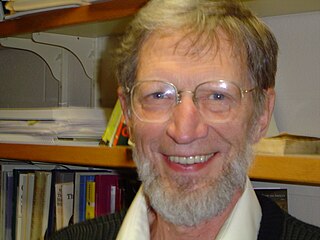Related Research Articles

Epistemology is the branch of philosophy concerned with knowledge, and is considered a major subfield of philosophy, along with other major subfields such as ethics, logic, and metaphysics. Epistemologists study the nature, origin, and scope of knowledge, epistemic justification, the rationality of belief, and various related issues. Debates in epistemology are generally clustered around four core areas:
- The philosophical analysis of the nature of knowledge and the conditions required for a belief to constitute knowledge, such as truth and justification
- Potential sources of knowledge and justified belief, such as perception, reason, memory, and testimony
- The structure of a body of knowledge or justified belief, including whether all justified beliefs must be derived from justified foundational beliefs or whether justification requires only a coherent set of beliefs
- Philosophical skepticism, which questions the possibility of knowledge, and related problems, such as whether skepticism poses a threat to our ordinary knowledge claims and whether it is possible to refute skeptical arguments

Alvin Carl Plantinga is an American analytic philosopher who works primarily in the fields of philosophy of religion, epistemology, and logic.
Empirical evidence for a proposition is evidence, i.e. what supports or counters this proposition, that is constituted by or accessible to sense experience or experimental procedure. Empirical evidence is of central importance to the sciences and plays a role in various other fields, like epistemology and law.

Nicholas Rescher is a German-American philosopher, polymath, and author, who has been a professor of philosophy at the University of Pittsburgh since 1961. He is chairman of the Center for Philosophy of Science and was formerly chairman of the philosophy department.

Nicholas Paul Wolterstorff is an American philosopher and theologian. He is currently Noah Porter Professor Emeritus of Philosophical Theology at Yale University. A prolific writer with wide-ranging philosophical and theological interests, he has written books on aesthetics, epistemology, political philosophy, philosophy of religion, metaphysics, and philosophy of education. In Faith and Rationality, Wolterstorff, Alvin Plantinga, and William Alston developed and expanded upon a view of religious epistemology that has come to be known as Reformed epistemology. He also helped to establish the journal Faith and Philosophy and the Society of Christian Philosophers.
Laurence BonJour is an American philosopher and Emeritus of Philosophy at the University of Washington.
Gilbert Harman was an American philosopher, who taught at Princeton University from 1963 until his retirement in 2017. He has published widely in philosophy of language, cognitive science, philosophy of mind, ethics, moral psychology, epistemology, statistical learning theory, and metaphysics. He and George Miller co-directed the Princeton University Cognitive Science Laboratory. Harman has taught or co-taught courses in Electrical Engineering, Computer Science, Psychology, Philosophy, and Linguistics.
Alvin Ira Goldman is an American philosopher who is Emeritus Board of Governors Professor of Philosophy and Cognitive Science at Rutgers University in New Jersey and a leading figure in epistemology.
Formal epistemology uses formal methods from decision theory, logic, probability theory and computability theory to model and reason about issues of epistemological interest. Work in this area spans several academic fields, including philosophy, computer science, economics, and statistics. The focus of formal epistemology has tended to differ somewhat from that of traditional epistemology, with topics like uncertainty, induction, and belief revision garnering more attention than the analysis of knowledge, skepticism, and issues with justification.
Larry Laudan was an American philosopher of science and epistemologist. He strongly criticized the traditions of positivism, realism, and relativism, and he defended a view of science as a privileged and progressive institution against popular challenges. Laudan's philosophical view of "research traditions" is seen as an important alternative to Imre Lakatos's "research programs".
Isaac Levi was an American philosopher who served as the John Dewey Professor of Philosophy at Columbia University. He is noted for his work in epistemology and decision theory.

Philosophy is a systematic study of general and fundamental questions concerning topics like existence, reason, knowledge, values, mind, and language. It is a rational and critical inquiry that reflects on its own methods and assumptions.

Gregory Wheeler is an American logician, philosopher, and computer scientist, who specializes in formal epistemology. Much of his work has focused on imprecise probability. He is currently Professor of Philosophy and Computer Science at the Frankfurt School of Finance and Management, and has held positions at LMU Munich, Carnegie Mellon University, the Max Planck Institute for Human Development in Berlin, and the New University of Lisbon. He is a member of the PROGIC steering committee, the editorial boards of Synthese, and Minds and Machines, and was the editor-in-chief of Minds and Machines from 2011 to 2016. In 2019 he co-founded Exaloan AG, a financial technology company based in Frankfurt. He obtained a Ph.D. in philosophy and computer science from the University of Rochester under Henry Kyburg.
Jonathan Lee Kvanvig is Professor of Philosophy at Washington University in St. Louis.
William Hatcher Davis was Professor of Philosophy at Auburn University, where he taught for 47 years and served as Chair of the Department of Philosophy. He was interested in the philosophy of religion, ethics, epistemology, and pragmatism. Among his publications are The Freewill Question, Peirce's Epistemology, and "Why be Moral?".
Religious epistemology broadly covers religious approaches to epistemological questions, or attempts to understand the epistemological issues that come from religious belief. The questions asked by epistemologists apply to religious beliefs and propositions whether they seem rational, justified, warranted, reasonable, based on evidence and so on. Religious views also influence epistemological theories, such as in the case of Reformed epistemology.

Peter Gregory Boghossian is an American philosopher and pedagogist. Born in Boston, he was a non-tenure track assistant professor of philosophy at Portland State University for ten years, and his areas of academic focus include atheism, critical thinking, pedagogy, scientific skepticism, and the Socratic method. He is the author of A Manual for Creating Atheists and How to Have Impossible Conversations: A Very Practical Guide.

Tina Fernandes Botts is an American legal scholar and philosophy professor currently teaching at the San Joaquin College of Law. She is known for her work in legal hermeneutics, intersectionality, feminist philosophy, and philosophy of race. Previous posts include Visiting Scholar at Dartmouth College; Visiting Professor of Law at University of the Pacific, McGeorge School of Law; Assistant Professor of Philosophy at California State University, Fresno; Visiting Assistant Professor of philosophy at Oberlin College; Fellow in Law and Philosophy at the University of Michigan, Ann Arbor; and Assistant Professor of Philosophy, and Faculty Associate and Area Leader in Public Policy and Diversity, at the University of North Carolina at Charlotte. She is the former chair of the American Philosophical Association's Committee on the Status of Black Philosophers (2013-2016).

The New York University Department of Philosophy is ranked 1st in the US and 1st in the English-speaking world as of the most recent edition of the Philosophical Gourmet Report from 2021. It is also ranked 1st in the world by the 2023 QS World University Rankings, and is internationally renowned. It has particular strengths in epistemology, history of philosophy, logic, metaphysics, moral and political philosophy, philosophy of language, philosophy of logic and philosophy of mathematics, and philosophy of mind. The department offers B.A., M.A., and Ph.D. degrees in philosophy, as well as a minor in philosophy and a joint major in language and mind with the NYU Departments of Linguistics and Psychology. It is home to the New York Institute of Philosophy, a research center that supports multi-year projects, public lectures, conferences, and workshops in the field, as well as outreach programs to teach New York City high school students interested in philosophy.
Duncan Pritchard is the chancellor's professor of philosophy and the director of graduate studies at the University of California, Irvine. He was previously professor of philosophy and chair in epistemology at the University of Edinburgh. His research is mainly in the field of epistemology. He has studied the problem of scepticism, the epistemic externalism/internalism distinction; the rationality of religious belief; testimony; the relationship between epistemic and content externalism; virtue epistemology; epistemic value; modal epistemology; Wittgensteinian hinge epistemology; the history of scepticism; and epistemological contextualism.
References
- ↑ Beck, Ori; Gupta, Anil; Haddock, Adrian; Pryor, James; Smithies, Declan (March 2018). "Discussion of James Pryor's "The Merits of Incoherence"". Analytic Philosophy. 59 (1): 142–148. doi:10.1111/phib.12117. hdl: 1893/27146 . ISSN 2153-9596.
- ↑ Comesar'ia, Juan (2013). "Reply to Pryor". Contemporary Debates in Epistemology: 239. Retrieved 30 November 2018.
- ↑ Weinberg, Justin (2019-04-24). "Pryor from NYU to UNC". Daily Nous. Retrieved 2021-07-15.
- ↑ Sayre-McCord, Geoff. "Jim Pryor". Department of Philosophy. Retrieved 2021-07-15.